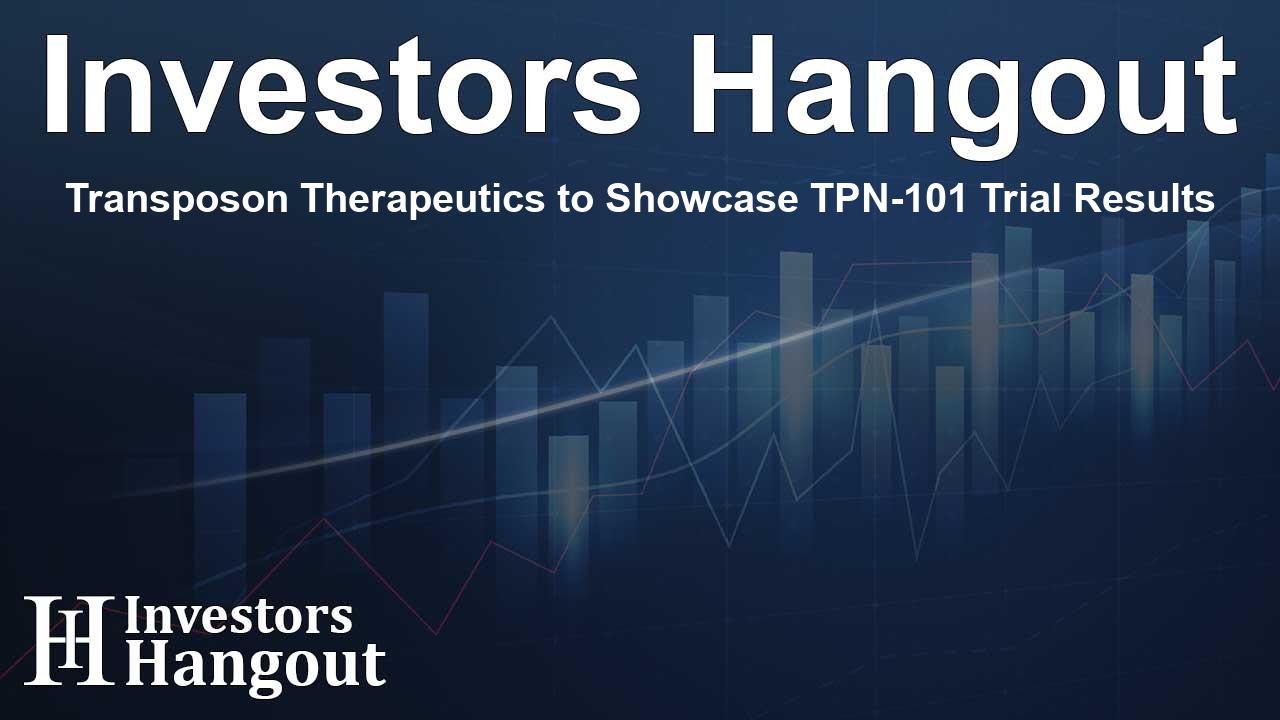Transposon Therapeutics to Showcase TPN-101 Trial Results

Transposon Therapeutics to Present Phase 2 Results of TPN-101
Transposon Therapeutics, a pioneering biotechnology company, is set to present the results of its Phase 2 study of TPN-101 at the upcoming 35th International Symposium on ALS/MND. This study focuses on patients diagnosed with ALS and frontotemporal dementia (FTD) linked to the C9orf72 gene mutation. Through their innovative research, Transposon aims to uncover new pathways to treat challenging neurodegenerative diseases.
Overview of TPN-101 Study Results
The findings reveal that treatment with TPN-101 provides notable clinical benefits. Key clinical outcome measures are significantly improved, including the Revised ALS Functional Rating Scale (ALSFRS-R) and Slow Vital Capacity (SVC). Notably, the drug also demonstrated the ability to lower important biomarkers associated with neurodegeneration and neuroinflammation, such as neurofilament light chain (NfL) and interleukin 6 (IL-6).
Details of the Study Presentation
Andrew Satlin, M.D. will present a poster titled "A Phase 2A study of TPN-101, a nucleoside reverse transcriptase inhibitor, in patients with C9ORF72-related ALS/FTD" during Poster Session B, scheduled for Saturday, December 7, 2024, from 5:30 to 7:00 PM EST. Attendees will gather at location 517b/c to engage with the research findings.
Comprehensive Phase 2 Study Approach
The Phase 2 study was a meticulously designed clinical trial involving 42 participants. The study employed a multi-center, randomized, double-blind, placebo-controlled parallel-group design with an open-label treatment phase. Participants were randomized in a 3:2 ratio to receive either a daily dose of 400 mg of TPN-101 or a placebo. The trial included a robust six-week screening, followed by a 24-week double-blind treatment period and an additional 24-week open-label treatment phase, culminating in a four-week follow-up post-treatment.
Understanding TPN-101
TPN-101 is engineered to specifically target and inhibit the LINE-1 reverse transcriptase, a crucial component that facilitates the replication of LINE-1 elements in the genome. These retrotransposable elements can, when overproduced, instigate neuroinflammation and contribute to the progression of neurodegenerative diseases—a significant focus of Transposon's innovative therapeutic approach.
Key Information about ALS and FTD
Amyotrophic lateral sclerosis (ALS) is a severe neurodegenerative disorder that leads to progressive muscle degeneration and loss of functionality, including the ability to speak, eat, move, or breathe. Frontotemporal dementia (FTD) is characterized by progressive changes in behavior and personality, often leading to emotional disturbances and communication difficulties. Notably, the C9orf72 hexanucleotide repeat mutation is responsible for 10-15% of ALS and FTD cases, emphasizing the need for targeted therapies.
About Transposon Therapeutics
Transposon Therapeutics, Inc. is leading the charge in biopharmaceutical innovation, developing a range of new treatments specifically aimed at addressing neurodegenerative and aging-related conditions, including Alzheimer's disease. Their flagship compound, TPN-101, is the first of its kind targeting LINE-1 reverse transcriptase, making a significant impact in the neurodegenerative disease landscape while the company's extensive discovery platform continues to foster a promising pipeline of therapies.
Frequently Asked Questions
What is the focus of the Phase 2 study presented by Transposon?
The Phase 2 study focuses on testing TPN-101 for patients with C9orf72-related ALS and FTD.
What are the key results of TPN-101 treatment?
Key results indicate clinical benefits in ALSFRS-R and SVC, as well as reductions in biomarkers like NfL and IL-6.
Who will present the study findings at the symposium?
Dr. Andrew Satlin will be the presenter for the study findings at the International Symposium.
What does TPN-101 target in its mechanism of action?
TPN-101 specifically inhibits LINE-1 reverse transcriptase, affecting the replication of retrotransposable elements.
How common are C9orf72-related disorders?
C9orf72 hexanucleotide repeat mutation accounts for roughly 10-15% of ALS and FTD cases, highlighting its importance in research efforts.
About Investors Hangout
Investors Hangout is a leading online stock forum for financial discussion and learning, offering a wide range of free tools and resources. It draws in traders of all levels, who exchange market knowledge, investigate trading tactics, and keep an eye on industry developments in real time. Featuring financial articles, stock message boards, quotes, charts, company profiles, and live news updates. Through cooperative learning and a wealth of informational resources, it helps users from novices creating their first portfolios to experts honing their techniques. Join Investors Hangout today: https://investorshangout.com/
Disclaimer: The content of this article is solely for general informational purposes only; it does not represent legal, financial, or investment advice. Investors Hangout does not offer financial advice; the author is not a licensed financial advisor. Consult a qualified advisor before making any financial or investment decisions based on this article. The author's interpretation of publicly available data shapes the opinions presented here; as a result, they should not be taken as advice to purchase, sell, or hold any securities mentioned or any other investments. The author does not guarantee the accuracy, completeness, or timeliness of any material, providing it "as is." Information and market conditions may change; past performance is not indicative of future outcomes. If any of the material offered here is inaccurate, please contact us for corrections.